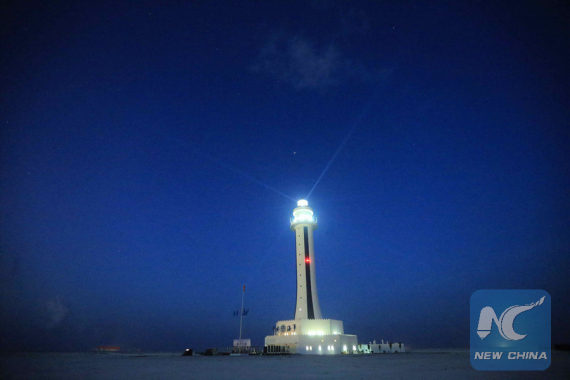
Photo taken on April 5, 2016 shows the lighthouse on Zhubi Reef of Nansha Islands in the South China Sea, south China. (Xinhua file photo)
China is defending not only its territorial sovereignty but world peace and stability when fighting against the obstinacy displayed in the South China Sea arbitration.
The Arbitral Tribunal in the South China Sea arbitration, established at the unilateral request of the Republic of the Philippines, claimed on Wednesday that it would issue the final "award" on July 12.
Since January 22, 2013 when the Philippines unilaterally initiated the arbitration on the relevant disputes between China and the Philippines in the South China Sea, the Chinese government has repeatedly reiterated that it would neither accept nor participate in the arbitration.
In a show of stubbornness, the arbitral tribunal in The Hague risks opening a Pandora's Box at sea, which would have dangerous consequences.
From the very beginning, the tribunal, established on the basis of illegal conduct and claims of the Philippines, has no jurisdiction over the relevant matters.
The tribunal disrespects the fact that China and the Philippines have agreed to settle their relevant disputes in the South China Sea through bilateral negotiation. The arbitration proceeding under the United Nations Convention on the Law of the Sea (UNCLOS) does not apply to the relevant disputes between China and the Philippines in the South China Sea.
With the essence of the Philippines' requests being about territorial sovereignty and maritime delimitation, it also turns a blind eye to the declaration made by China in 2006 on optional exceptions in accordance with the UNCLOS, which excludes disputes concerning maritime delimitation, among others, from arbitration and other compulsory dispute settlement procedures. Some 30 nations have made similar declarations.
Therefore, the tribunal has violated the UNCLOS and expanded and abused its power at will by hearing the cases and exercising jurisdiction. Whatever the results it is to render, they will be illegal and null and void.
By indulging the unwise initiation by the Philippines, which breaches international law, the tribunal has not only worsened the tensions between China and the Philippines, but also undermined regional stability and international maritime order.
It should be noted that China's position to neither participate in nor accept the results of the arbitration does not mean the country disobeys international law. Actually, it demonstrates China's commitment to upholding its rights vested in the international order.
The role international conventions play in defending international order can never be underestimated. Over the decades since the end of WWII, they have contributed to the relatively stable international relations despite changes in the balance in national strength. Hundreds of international treaties have been formulated by the international community to regulate national behavior.
Without these rules, the current international order will be threatened, and the law of the jungle will once again dominate the world.
True, the role played by some outsiders in the arbitration is suspicious. There is a power, though not a party concerned, frequently trumpeting the significance of rule of law in the international community. But its actions and words expose nothing but its hypocrisy as it lends support to Manila and the tribunal.
For that nation, violations of international conventions could be "branded" as acts of defense, as with its militarizing of the South China Sea through greater presence of forces in the name of opposing the militarization in the region.
With regard to territorial issues and maritime delimitation disputes, China does not accept any means of third party dispute settlement or any solution imposed on China.
China will continue to be a responsible player and contributor within the established international order, upholding international law and basic norms governing international relations as enshrined in the Charter of the United Nations.
It will also continue to work with states directly concerned to resolve the relevant disputes in the South China Sea through negotiation and consultation in accordance with international law.
The Philippines and those who persist in issuing an irresponsible "award" are destined to swallow the fruits of the arbitration.


















































